AI in Retail: Enhancing Retail Shopping Experiences

Over the last several years, the retail industry has had a substantial digital shift. This change is made possible by the integration of predictive technologies and sophisticated data analytics. It has drived significant gains in accuracy, speed, and efficiency across a range of retail business areas. The convergence of artificial intelligence and the Internet of Things is one of the leading forces behind this change. AI in retail paves ways for businesses to sophisticated data insights that are used to improve operations and identify wise business opportunities.
In the retail environment, artificial intelligence (AI) has become a key player in ushering in a new age of unmatched insights and unrealized possibilities. Using sophisticated algorithms and machine learning capabilities, artificial intelligence (AI) for inventory management provides merchants with a vast array of refined data and insight. This information, which comes from a variety of sources, serves as the foundation for efficient operations across many retail divisions.
Let’s examine how the retail industry has changed dramatically as a result of the fusion of IoT and AI. AI uses IoT as a medium to apply essential modifications via intelligence analysis. The smooth data flow made possible by this seamless device and system interface improves several facets of retail. Efficiency, accuracy, and general effectiveness in retail operations are the result of supply chain optimization and inventory management.
This blog will help you comprehend the many applications of artificial intelligence (AI) in the retail sector and everything associated with it. We will examine the main uses of AI and machine learning in retail and their advantages.
However, before discussing the specifics of AI for retail, let’s examine the most recent market size for AI in the retail sector.
AI in Retail: A Synopsis of the Market
Growing customer preferences and the need for operational efficiency will drive considerable expansion in AI sector. This convergence of technology and retail, which is transforming the shopping experience, is shaping the future of the industry.
Grand View Research projects that the worldwide AI retail market will grow at a CAGR of 23.9% from 2022 to 2030, with a projected value of $40.74 billion. The retail industry’s enhanced digitalization is responsible for the market’s growth.
AI is an effective technology that helps merchants make customer-focused choices by swiftly examining vast volumes of data. Predictive analytics aid demand forecasting, pricing strategy optimization, inventory management, and overall cost efficiency.
According to a Gartner survey, nearly 50% of retail respondents regularly use AI technology in their everyday operations. The retail sector’s interest in generative AI, especially OpenAI’s ChatGPT, has never been so high. Retailers have a choice as this technology is more accessible. To enhance their performance and find practical applications, they need to seize the opportunity presented by generative AI for retail.
The use of AI in retail and its rising market indicates that it is a viable alternative for retailers trying to increase productivity and optimize return on investment. This pattern suggests that using AI-based solutions in the retail industry may be a viable avenue for company efficiency and development.
Amazon, the colossus of e-commerce, employs AI extensively in its retail operations, with Walmart and Target following soon after. IDC predicts that, after banking, the retail industry will be among those making significant investments in AI in 2023. Moreover, the adoption rate is predicted to increase by 2025. Retailers use AI-based digital solutions to address shifting customer behavior, workforce shortages, and supply chain interruptions.
AI in Retail Market Key Takeaways
- By geography, The North America region accounted for more than 39.14% of revenue share in 2023.
- By components, the solution segment contributed more than 72% of revenue share in 2023.
- By technology, the machine learning segment generated more than 31% of revenue share in 2023.
- By sales channels, the pure-play market segment gained a sizeable revenue share.
- By application, the customer relationship management segment captured around 21.50% of revenue share in 2023.
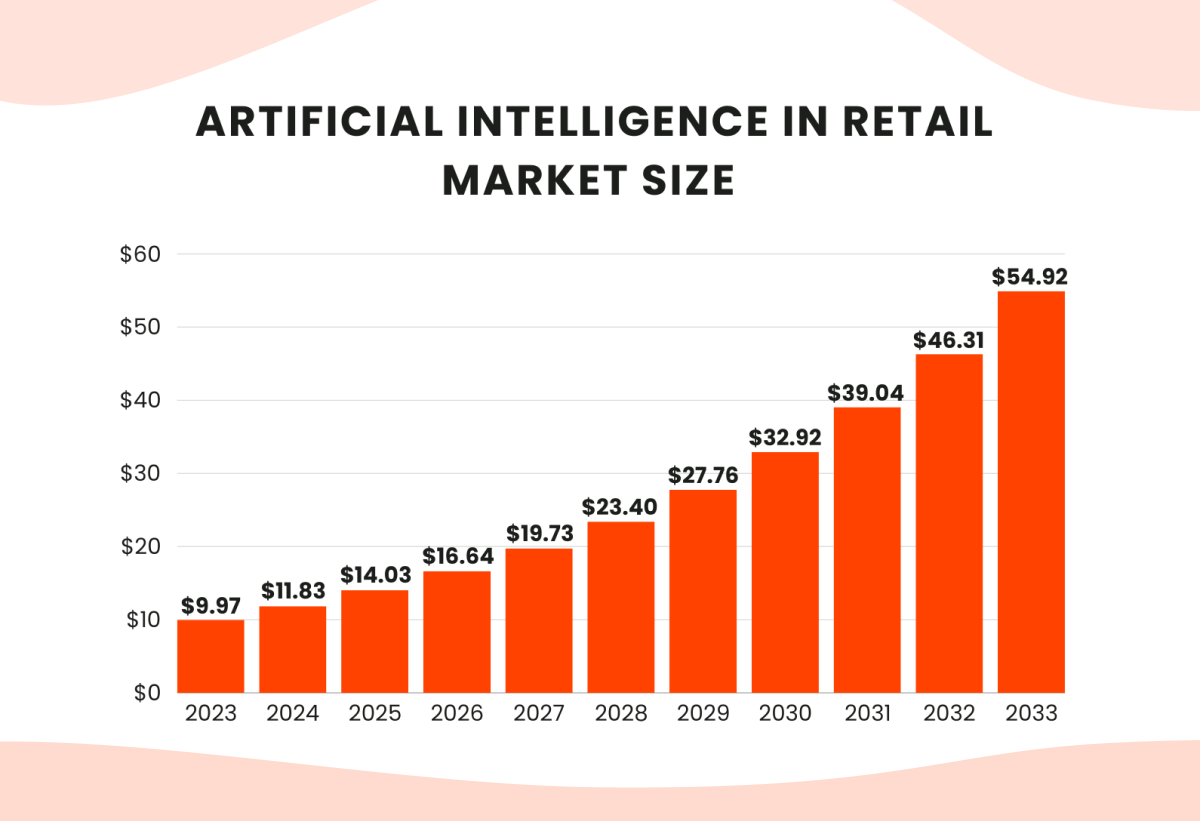
What Advantages Does AI Offer Retailers?
The integration of AI and ML can increase speed, efficiency, and accuracy in every area of the retail business. Providing high-level data and information has enabled companies to enhance retail operations and create new business prospects.
While AI has many advantages for retail, these four are the main ones that merchants should be aware of.
Enhanced Interaction with Customers
Using artificial intelligence retail solutions, retailers may provide seamless customer service in a variety of situations. It majorly include automated checkouts to client mood monitoring. Additionally, clients may enjoy immersive and tailored shopping experiences using AI-based retail solutions. Integrating AI into buying eventually results in more consumer interaction.
Improved Client Relationships
Retailers must distinguish their items and provide customers with engaging services and experiences to sustain interest. Businesses may get additional market information by using predictive analytics in retail.
Retailers must integrate AI into retail to distinguish their items and provide customers with engaging services and experiences to sustain interest.
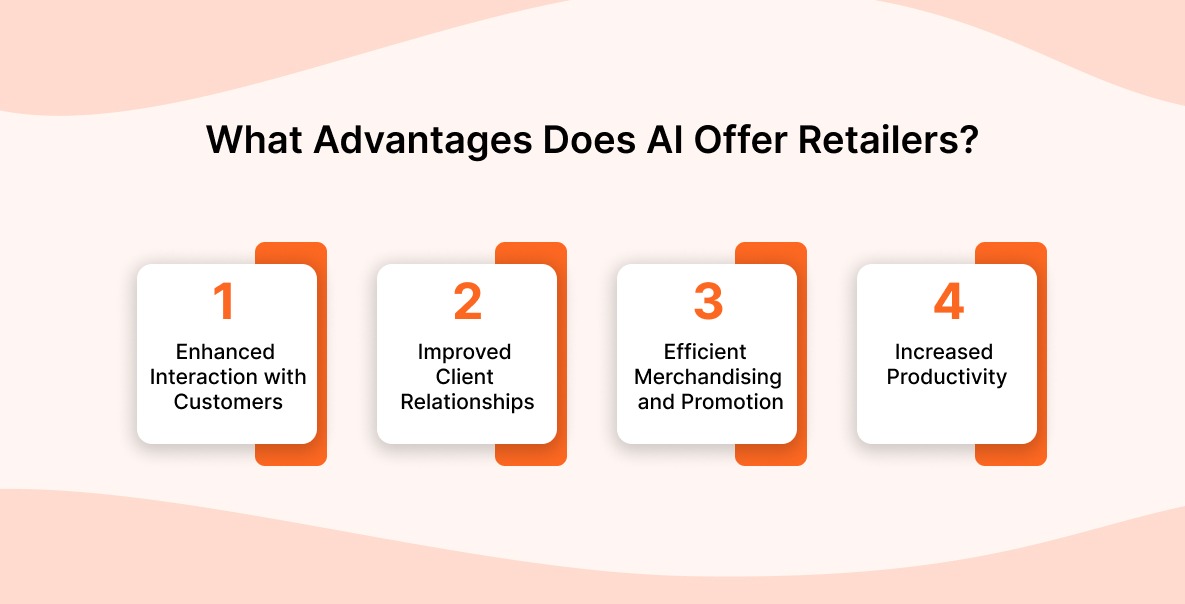
Efficient Merchandising and Promotion
Retail artificial intelligence technologies power marketing and merchandising planning, assisting with consumer segmentation, content generation, and creating and implementing focused advertising campaigns. For instance, Walmart plans to employ robots to scan its shelves to improve its product mix. It is now utilizing AI to scan the products offered by rivals.
Increased Productivity
In the retail business, artificial intelligence helps and improves more challenging labor while mechanizing commonplace jobs. AI is used in the retail sector to streamline various processes, including labor scheduling, delivery tracking, and delivery route planning.
These examples of artificial intelligence in the retail sector will help you comprehend how this disruptive technology is transforming day-to-day operations in all retail sectors.
Understanding Applications of AI in Retail
As we know it, the brick-and-mortar retail industry is facing a “Retail Apocalypse,” with hundreds of conventional retail businesses declaring their intention to shut their doors due to their inability to provide the same output as online retail outlets.
A few of the biggest names in retail have begun using artificial intelligence to stay afloat in the face of the terrifying future that awaits the industry.
Let’s examine a few sectors where AI and retail are making a significant impact.
Simplifying Logistics and Supply Chain
An intelligent, networked, and highly effective supply chain is one of the critical components of the idea of a factor of the future. The supply chain itself offers numerous opportunities for introducing automation in the business process because of the large number of stakeholders that participate in it, including manufacturers, suppliers, retailers, distributors, and customers. Supply chain-focused generative AI solutions for retail are known to handle these tasks efficiently.
Supply chain and logistics management powered by artificial intelligence (AI) may assist businesses in anticipating and responding to changes in demand. It also helps in checking inventory levels, supplier capabilities, environmental conditions, and even consumer demands. This will guarantee better productivity, prompt delivery of goods and services, and more income.
AI is revolutionizing retail in supply chain and logistics in the following ways:
- Increasing demand forecasting precision
- Reducing inventory and operating expenses while improving client response times.
Estimating the Market for New Product Demand
Increasing the precision of production planning and factory scheduling by taking into consideration a variety of restrictions and then optimizing the supply chain for each
They are lowering freight expenses, enhancing supplier delivery capabilities, and lowering supplier risk.
Recognizing Your Clientele
Thanks to AI and ML, retailers now have a comprehensive understanding of their consumer base. Businesses may learn what their consumers desire and what discourages them from making repeat purchases by analyzing customer data and feedback.
The conclusions reached in this manner point to the future of artificial intelligence’s influence on organizations and how you use it to get firsthand knowledge of current and potential clients. Additionally, the data may be used to launch focused marketing initiatives, which have been shown to increase client retention rates in various retail establishments.
Providing Tailored Experiences
One of the best strategies for increasing and keeping loyal customers is to address their specific needs, which is readily achievable by combining customer experience and artificial intelligence.
According to research, companies that include AI-driven customization elements in their stores would like to see an increase in consumer loyalty. Brands can use AI, machine learning, and retail transactional data to monitor and analyze prior purchases, consumer behavior, and loyalty cards to provide more individualized solutions.
Sephora’s AI-powered in-store service, Color IQ, is a prime example of customer-focused AI in retail. It analyzes the surface of the customer’s skin and makes recommendations for beauty items depending on skin tone.
Reducing Out-of-Stock Items and Discounts
By using AI-powered solutions in retail settings, sellers may reduce the amount of safety stock they use and gain direct insights into store sales patterns. Retailers will no longer need to rely on seasonal markdowns, demonstrating the degree to which artificial intelligence is transforming the retail sector. AI is particularly useful when it comes to assigning or restocking inventory.
For example, H&M analyzes shop returns and receipts using artificial intelligence and big data retail solutions to assess purchases made at each location. Based on these insights, the company supplies its inventory.
Using AI tools in retail to analyze inventory would reduce the number of times retailers place large orders for unsold goods that are squandered and need to be returned, incurring needless increases in purchase and shipping costs.
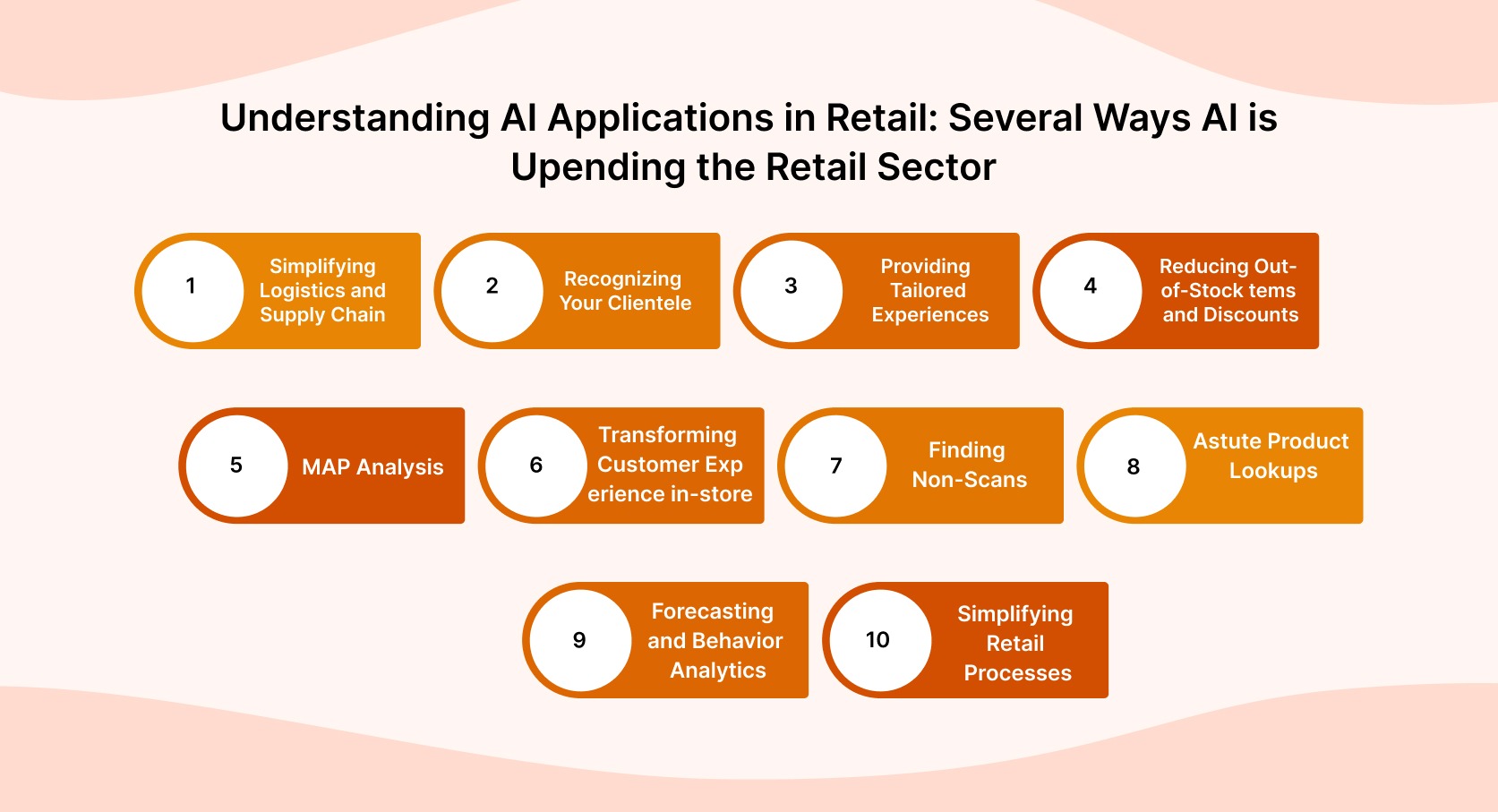
MAP Analysis
MAP Analysis is one of the most sought-after uses of AI in retail. The lowest price that a shop will advertise to sell a product is known as the Minimum Advertised Price (MAP). Retailers’ businesses may suffer if the items are offered at a price below MAP. Thus, it is essential to follow merchants who tamper with MAP pricing. Brands can stop MAP price infractions by using retail artificial intelligence to track and monitor items in real-time.
Transforming the Customer Experience in-store
Apparel businesses may use smart mirror technology in their stores to assist customers in seeing how an item of apparel appears on them. All they need to do is place the clothing in front of their body.
Giving customers additional alternatives to wear with the items they have chosen, along with the price of each item, will make mirror technology—one of the most widely used applications of AI in the retail sector—more sophisticated and easier to use.
AI-backed retail operations systems may also act as salespeople to help consumers in-store, shorten checkout lines with cashier-less payments, and restock inventory with real-time stock monitoring.
Finding Non-Scans using AI in RetailAI in retail
Retailers lose over $45 billion annually due to shrinkage and non-scans. AI may be used to address these disastrous checkout issues easily. Retailers may examine the video stream, identify instances when the product is left in scanned. It instantly notify the checkout personnel by using computer vision and artificial intelligence (AI) algorithms. At the moment of checkout, these technologies also assist in spotting fraud and errors.
Astute Product Lookups
In the retail industry, artificial intelligence may also make it easier for shoppers to look for products. Consumers may now use a photograph of a product or item they like that they saw in person to look for an online vendor. Here, machine learning makes item search and comparison more accessible than ever. It classifies a vast number of items from various merchants and sorting them for consumers in a matter of seconds.
Forecasting and Behavior Analytics
AI technology seems essential for retail establishments. This innovation will help retailers become more customer-centric by shifting through demands and wants.
With the help of data obtained via AI-driven analytics, retailers may make well-informed decisions on the quantity of goods to purchase depending on customer behavior. This will increase production and save the company money and time.
Retail companies may target their marketing and advertising efforts using AI calculations. They can base the calculation on their clients’ location, inclinations, gender, and purchasing patterns. Enhancing client loyalty and retention may be beneficial since providing a personalized experience is a great way to demonstrate concern for your customers.
Simplifying Retail Processes
Retail multichannel marketing has complicated shop operations. In a warehouse, store workers are required to do many tasks. The days of receiving items, stocking them, and maintaining inventory are long gone from their jobs. In addition, they have to manage merchandising, monitor special offers, and provide product information. By automating back-office tasks and using robots for quality inspections, AI in retail may simplify the job of a shop manager. Many hours may be saved at the warehouse by efficiently using the time saved for other fruitful tasks.
Discovering the AI Use Cases in Retail: How Big Retailers Are Using AI
It’s a fact that shops that use artificial intelligence in their operations have a competitive edge. A few well-known companies have already begun integrating AI into their daily operations to increase productivity and provide customers with a better shopping experience.
These are a few notable instances of large retail corporations using AI/ML to enhance customer satisfaction and boost revenue. These examples of AI in retail might help you comprehend how this revolutionary technology is transforming day-to-day operations in all retail sectors.
LoweBot at Lowes Assists Customers
The LoweBot is a robot that Lowes employs to help consumers navigate its shops. Inquiring inquiries help consumers identify goods, provide instructions, and exchange knowledge, all while these robots monitor the inventory.
Walgreens Tracks the Flu Epidemic
Walgreens uses AI to monitor the spread of the virus by looking at antiviral medicines filled at its stores. Customers may learn more about local flu activity from this data, which also helps the retailer manage inventory.
Sephora’s Cosmetic Support
Sephora’s Color iQ scans faces to offer customized foundation and concealer tones, and Lip IQ assists in finding the ideal lipstick shade, making a smooth beauty shopping experience possible.
Visual Search by Neiman Marcus
Using artificial intelligence (AI), Neiman Marcus’s Snap-Find-Shop app enables customers to take images of items in its inventory and locate them, similar to text-based searches.
Ordering using Tacobot at Taco Bell
Taco Bell’s Tacobot, which enables AI-driven ordering over Slack and allows users to personalize and submit orders by text or voice quickly, is another example of how AI/ML is being used in retail.
Macy’s AI Support in-store
One of the best examples of AI being used in retail is the Macy’s On Call app. The software helps users find their way around establishments, provides directions, verifies product availability, and even notifies staff members when a client needs help.
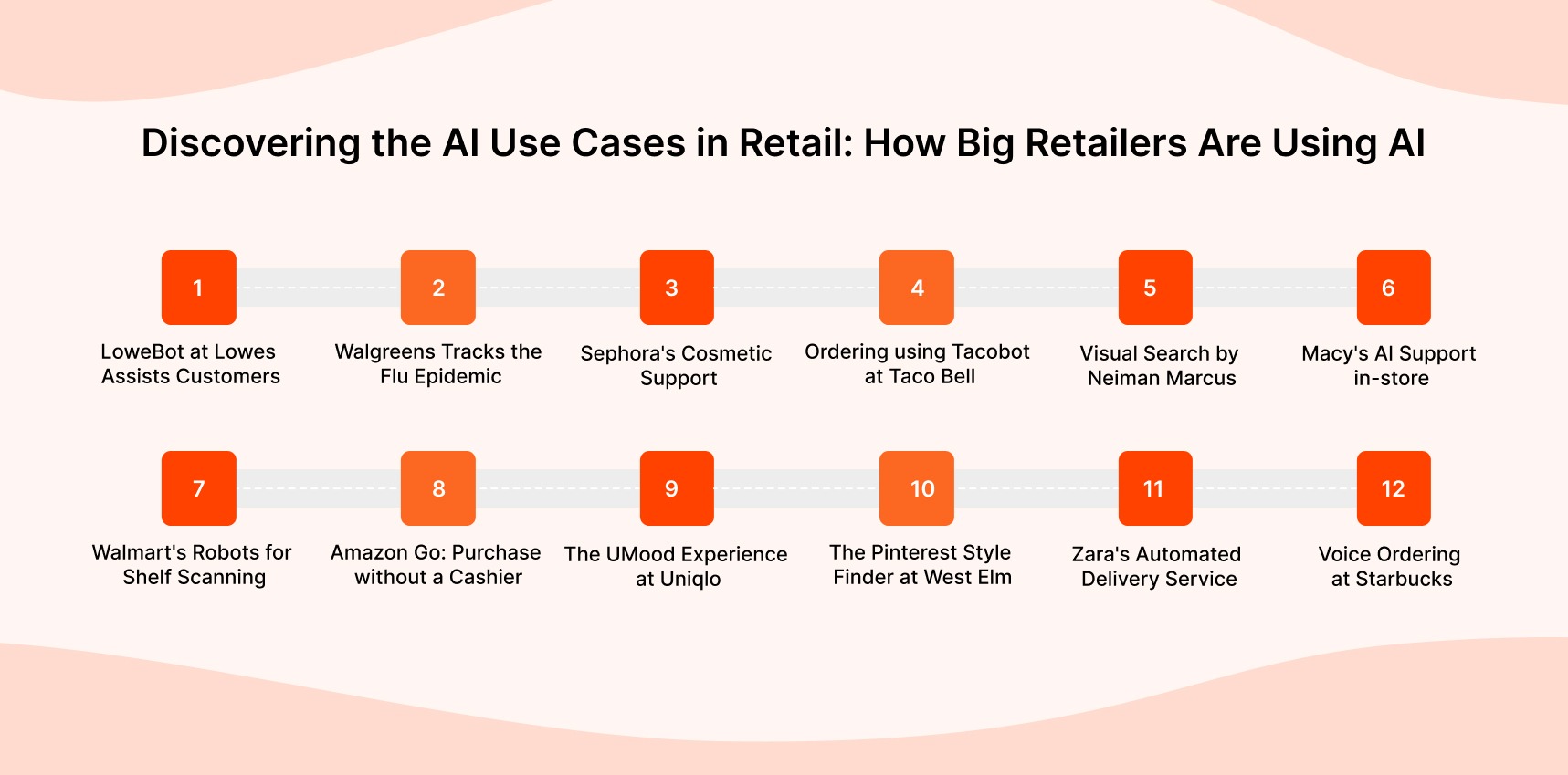
Walmart’s Robots for Shelf Scanning
Walmart is testing robots that check shelves for missing products, pricing changes, and restocking requirements so that staff may concentrate on providing customer care.
Amazon Go: Purchase without a Cashier
Amazon Go is another well-known retail AI use case. The Amazon Go shops instantly charge clients’ accounts for the things they pick, enabling cashierless shopping with the aid of AI-powered sensors and cameras.
The UMood Experience at Uniqlo
UMood kiosks from Uniqlo provide a unique shopping experience by analyzing how customers respond to different designs and colors and then making product recommendations based on their answers.
The Pinterest Style Finder at West Elm
The Pinterest Style Finder powered by AI at West Elm looks through clients’ boards and suggests furniture and home décor that matches their tastes.
Zara’s Automated Delivery Service
Zara uses robots to expedite order pickups, increasing consumer convenience and efficiency.
Voice Ordering at Starbucks
With the My Starbucks Barista app, consumers can place voice and text-based orders, bypass Lineups, and have their orders ready when they arrive.
Overcoming Retail AI Integration Challenges with Workable Solutions
Although using AI in the retail sector has its share of difficulties, successful integration may be achieved by adhering to best practices.
Data Security and Customer Privacy
AI systems often need access to private client data, which raises security and privacy issues.
Solution
Put strict data security procedures in place, such as safe access restrictions and encryption. Follow data privacy laws, such as the GDPR, and be open and honest with consumers about how your data is used.
Scalability Problems
Because AI solutions need different levels of performance and integration, scaling them from pilot projects to full-scale operations may be difficult.
Solution
From the beginning, design AI systems with scalability in mind. To handle expansion, make use of modular AI solutions and scalable cloud services.
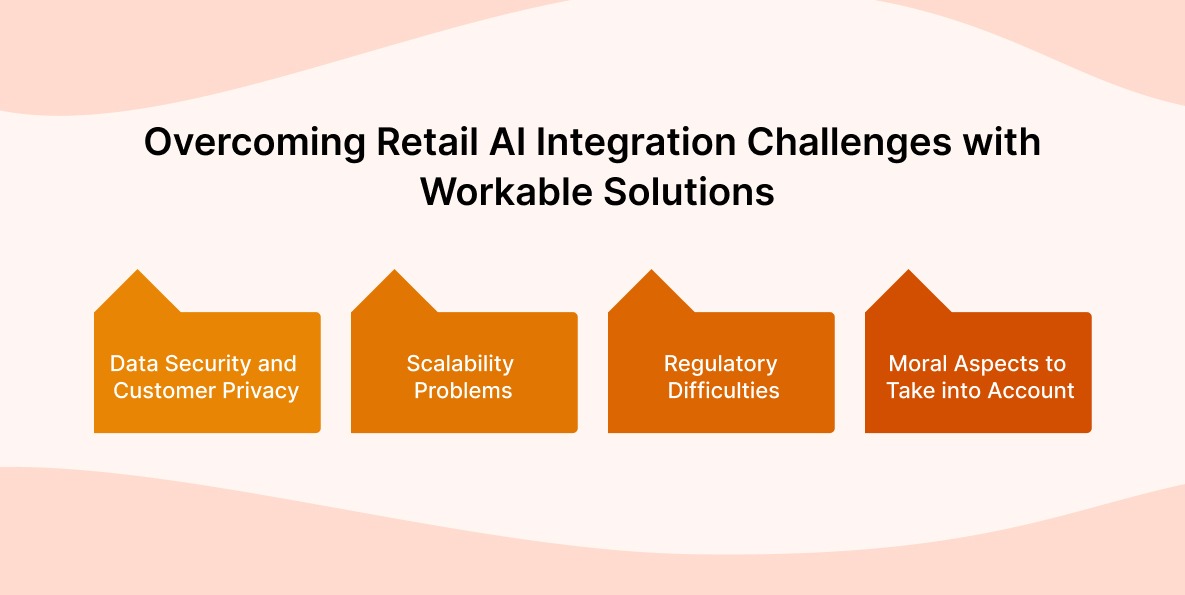
Regulatory Difficulties
Navigating the intricacies of changing norms and laws may be challenging since the legal requirements for AI fluctuate depending on the location.
Solution
To guarantee compliance, stay updated on rules and get legal advice from professionals. Create flexible systems that can be modified to meet changing legal needs.
Moral Aspects to Take into Account
It isn’t easy to guarantee that AI technologies are used morally and do not negatively impact society or customers.
Solution
Create and implement moral standards for AI applications, work with relevant parties to resolve ethical issues, and encourage accountability and openness in the procedures used to make AI decisions.
Conclusion
Artificial intelligence has many benefits for the retail industry. Using AI may improve your company’s efficiency by providing clear insights into emerging trends and enhancing client experiences.
AI in retail will rise significantly in the future, paving the door for more efficiency, customization, and consumer interaction. It’s also critical to realize that Conversational AI in retail has the potential to create content for a variety of retail industries. This majorly include product descriptions, ads, and even virtual shopping experiences. Thanks to this technology, retailers should create distinctive and customized consumer experiences more efficiently, increasing brand loyalty.
AI’s capacity to manage large datasets will enable hyper-personalized suggestions, supporting retail cross-selling and up-selling tactics. As features develop, artificial intelligence integration into the retail industry will become more critical if merchants want to stay competitive and provide unmatched consumer experiences.
If you’re looking to integrate AI in your retail business and need a professional AI development company, you can trust Mtoag Technologies. Its highly skilled team of experts will handle all of your issues while assisting you in implementing clever AI-driven solutions for your retail business.
Contact our specialists for excellent artificial intelligence services. Your AI demands in retail have officially been met!
FAQs
What impact does AI have on the retail sector?
Globally, AI is transforming significant sectors in various ways. It is significantly improving forecasting, preventive, and predictive capabilities in the retail sector. Businesses may use it to map out the pricing, predict needs, and better understand their users.
How will AI affect retail in the future?
With a projected value of $40.74 billion, retail artificial intelligence (AI) is likely to integrate with other disruptive technologies, such as blockchain, AR/VR, and others, to create intelligent, future-focused retail spaces.
Does AI boost sales and enhance retail?
Indeed. AI in retail provides a comprehensive understanding of consumers, including their shopping habits and areas of annoyance. Along with other insights aimed at their long-term sales and profit-generating capabilities, it also provides them with information on the stocks they should replenish or cease buying for a time.
What advantages does AI have for retail?
AI has many advantages in the retail industry, including raising customer happiness, optimizing the supply chain, generating fresh user experiences, identifying non-scans, and more.


